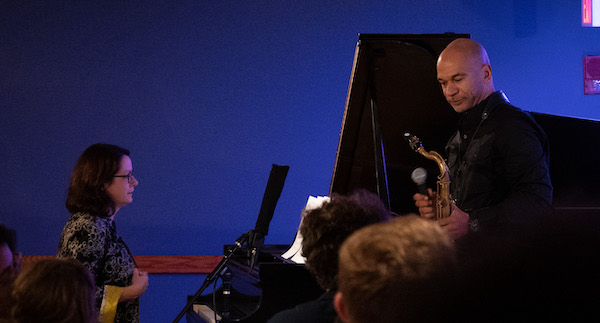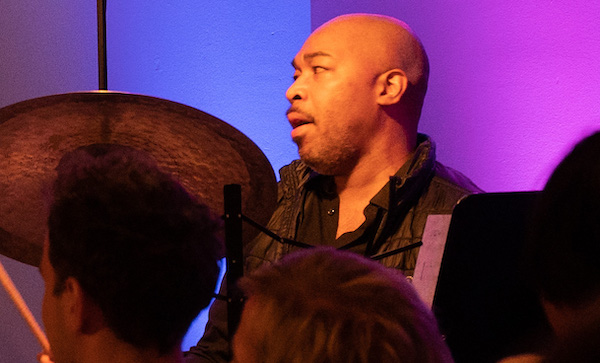Jazz Concert Review: The Walter Smith III Quintet, Live at the Regattabar
By Michael Ullman
The Regattabar, located in the Charles Hotel, reopened after being shuttered for three years following the Covid epidemic.

Kris Davis and Walter Smith III at the newly reopened Regattabar. Photo: Michael Ullman
Last Friday night was big for Boston-area musicians, students, and jazz fans. The Regattabar, located in the Charles Hotel, reopened after being shuttered for three years following the Covid epidemic. It was a grievous loss: the Regattabar had been presenting great jazz for approximately three decades. Many of us never expected that a reopening would take place. It still seems unlikely. The Regattabar first opened in 1985. Comfortable and well appointed, the club sits upstairs in the Charles Hotel in the middle of Harvard Square, available to transportation of all kinds. The music produced there lives on in people’s memories. Friday night’s headliner, tenor saxophonist Walter Smith III, recalled sneaking into the Regattabar (he paid for his ticket) in an oversize overcoat that he hoped hid the amateur recording device he brought with him: he remembered taping the Tommy Flanagan trio, Dave Holland, and Bill Frisell with Chris Potter.
Before the music began on Friday night at seven, the general manager of the hotel, Alex Attia, stated his admirable goals for the place: “We are going to be consistent. We are going to be good for the community,” he insisted. Jeremy Cohen, the entertainment manager, will be doing the bookings, and he said that he hopes local musicians along with relative outsiders will be welcomed.
Being in Boston, Cohen doesn’t have to compromise his standards when he goes “local.” Most of the members of the Walter Smith III Quintet have local ties. Smith himself teaches at Berklee. Grammy award-winning pianist Kris Davis is the Associate Program Director of Creative Development at the Berklee Institute of Jazz and Gender Justice and the founder of Pyroclastic Records. (Any Pyroclastic record is worth hearing, I have discovered.) Her new album is Diatom Ribbons: Live at the Village Vanguard (Arts Fuse review). Its release has brought her a singular honor: she is on the cover of the current DownBeat magazine. Guitarist Matt Stevens is another Grammy winner and a teacher at Berklee. He seems to pop up everywhere, with Esperanza Spalding, Dave Douglas, Teri Lynne Carrington and, of course, with Walter Smith III. Introducing the band, Smith, an especially genial and well-spoken host, turned to drummer Eric Harland and lamented that Harland and he were the only ones on stage who had yet to win a Grammy. He was misinformed. Harland laughingly retorted that he has already won three. So it was down to Smith and the equally Grammy-less bassist Harish Raghavan, who has been heard with Ambrose Akinmusire, Vijay Iyer, and many others.. His latest album as a leader is In Tense. His Grammy may still be coming.

Drummer Eric Harland at the newly reopened Regattabar. Photo: Michael Ullman
The quintet opened with “Quiet Song,” which will appear on Smith’s new disc, Return to Casual. The melody is both winding and unpredictable yet, in its way, simple. (Smith can sound like a country singer who is unconcerned with structure.) The saxophonist opened with a kind of fanfare, then let Kris Davis solo before returning with the melody. The group improvised together excitedly (there was also some heavy reading going on) until their leader took the volume down, ending with the quiet statements the piece’s title promised. The band continued with “River Styx,” which should have been about forgetting, but was, at least in part, a showcase for Smith’s virtuosity … and that of his pianist. Even in his arrangements, Smith left space for Davis. On “Styx” he stated an opening line — paused as Davis filled the gap — and then finished what he had to say. His solos take varied paths, creating impressions of freedom shaped by an indirect logic. Later, Smith played a pretty piece without ostentation that was audibly anchored by the teamwork of bassist Rahgavan and Harland’s bass drum.
My favorite work of the night was a duet between Smith and Davis that had the saxophonist holding a single note indefinitely while the pianist soloed with her usual grace and controlled power. The set ended with “Ace,” introduced by Matt Stevens, who throughout the evening played thick, dissonant chords that he moved around cannily, as if they were chessmen. On “Ace,” drummer Harland played a repeated figure: a bass drum thump was followed by a single snap on the snare and finally a crash on his cymbal. Smith seemed comforted by repetitive phrases — or maybe he saw them as a challenge? — because he and his all-star band generally always kept things moving. At the end, Smith cheerfully noted the many Berklee students and teachers in the audience. It would have been hard to miss them — they were giving the band a standing ovation. The saxophonist urged the crowd to remain loyal to the club and to the music. I wondered if someone in the crowd had snuck in a tape recorder.
Michael Ullman studied classical clarinet and was educated at Harvard, from which he received a PhD in English. The author or co-author of two books on jazz, he has written on jazz and classical music for the Atlantic Monthly, New Republic, High Fidelity, Stereophile, Boston Phoenix, Boston Globe, and other venues. His articles on Dickens, Joyce, Kipling, and others have appeared in academic journals. For over 20 years, he has written a bi-monthly jazz column for Fanfare Magazine, for which he also reviews classical music. At Tufts University, he teaches mostly modernist writers in the English Department and jazz and blues history in the Music Department. He plays piano badly.
